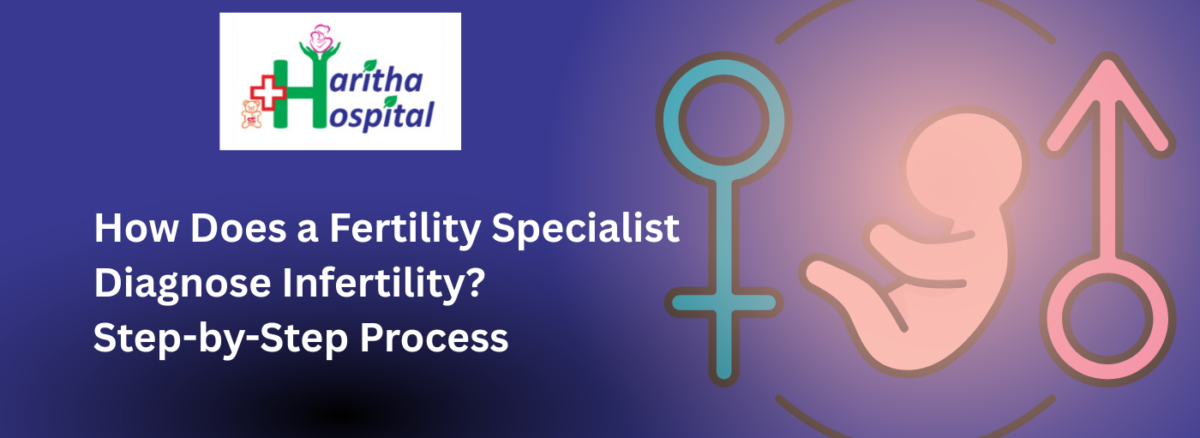How Does a Fertility Specialist Diagnose Infertility? Step-by-Step Process
Infertility is a common concern affecting many couples trying to conceive. A fertility specialist uses a systematic approach to diagnose the underlying causes and recommend the best course of treatment. If you’re looking for the “best fertility doctor in KPHB,” the “best infertility specialist in Hyderabad,” or a “fertility hospital in Kukatpally,” understanding the diagnostic process can help you prepare for your fertility journey.
Step 1: Initial Consultation and Medical History
The first step in diagnosing infertility is an in-depth consultation with a specialist. During this visit, the doctor will:
- Review your medical history, including past illnesses, surgeries, and existing health conditions.
- Discuss your menstrual cycle history to check for irregularities.
- Evaluate your lifestyle factors, such as diet, stress, smoking, and alcohol consumption.
- Review any previous pregnancies or miscarriages.
- Discuss your sexual health, frequency of intercourse, and any issues related to intimacy.
Step 2: Physical Examination
A thorough physical examination helps the doctor identify any visible signs of reproductive health concerns. For women, this includes:
- Pelvic exam is needed to check for abnormalities in the reproductive organs.
- Breast examination to detect any hormonal imbalances.
For men, the physical examination may include an evaluation of testicular health and signs of hormonal disorders.
Step 3: Hormonal and Blood Tests
Hormonal imbalances often play a major role in infertility. Blood tests are performed to measure hormone levels in both men and women. Some key tests include:
- Follicle-stimulating hormone (FSH) – Assesses ovarian reserve in women and sperm production in men.
- Luteinizing hormone (LH) – Regulates ovulation in women and testosterone production in men.
- Prolactin levels – High levels can disrupt ovulation.
- Thyroid function tests – Hypothyroidism or hyperthyroidism can impact fertility.
- Anti-Müllerian hormone (AMH) – Evaluates ovarian reserve.
- Testosterone levels – Helps in assessing male fertility.
Step 4: Ovulation and Menstrual Cycle Tracking
For women, tracking ovulation is crucial in understanding fertility. Methods used include:
- Basal body temperature charting – Monitoring temperature changes to detect ovulation.
- Ovulation predictor kits – Measuring LH surges.
- Ultrasound follicular study – Monitoring egg development in the ovaries.
- Progesterone blood test – This confirms whether ovulation has occurred.
Step 5: Imaging Tests and Ultrasounds
Imaging techniques help detect structural issues within the reproductive organs. These may include:
- Transvaginal ultrasound – Examines the uterus, ovaries, and fallopian tubes.
- Hysterosalpingography (HSG) – Uses contrast dye and X-rays to check for blocked fallopian tubes.
- Sonohysterography – Assesses the uterine cavity for abnormalities.
- Pelvic MRI – Provides detailed images of the reproductive organs for complex cases.
Step 6: Semen Analysis for Male Fertility
Male infertility is responsible for about 40% of infertility cases. A semen analysis evaluates:
- Sperm count – Determines the number of sperm per milliliter of semen.
- Sperm motility – Assesses how well sperm move.
- Sperm morphology – Examines the shape and structure of sperm.
- Semen volume and consistency – Indicates reproductive health.
Step 7: Advanced Genetic Testing (If Required)
In some cases, genetic testing may be recommended to identify chromosomal abnormalities affecting fertility. These tests include:
- Karyotyping – Checks for genetic disorders.
- Cystic fibrosis screening – Determines if the male partner carries a gene mutation affecting sperm production.
- PGT (Preimplantation Genetic Testing) – Used for IVF patients to ensure embryo health.
Step 8: Endometrial Biopsy and Laparoscopy (If Needed)
If the cause of infertility remains unclear, advanced diagnostic procedures may be necessary:
- Endometrial biopsy – Collects a small tissue sample from the uterus to examine implantation issues.
- Laparoscopy – A minimally invasive surgery to check for endometriosis, fibroids, or pelvic adhesions.
Step 9: Diagnosis and Treatment Plan
Once all test results are evaluated, the fertility specialist will provide a clear diagnosis and suggest an appropriate treatment plan. Options may include:
- Lifestyle modifications – Improving diet, exercise, and stress management.
- Medication – Hormonal treatments to regulate ovulation.
- Assisted reproductive technologies (ART) – Including IUI (Intrauterine Insemination) or IVF (In Vitro Fertilization).
- Surgical procedures – To remove blockages or correct abnormalities.
When to See a Fertility Specialist?
Consider visiting the “best fertility centre in Kukatpally,” a “fertility hospital in Kukatpally,” or the “best infertility specialist in Hyderabad” if:
- You’ve been trying to conceive for over a year without success (or six months if over 35).
- You have irregular or absent menstrual cycles.
- You’ve experienced multiple miscarriages.
- Your male partner has known fertility issues.
Conclusion
The journey to parenthood can be challenging, but understanding the step-by-step diagnosis process helps ease concerns. Seeking guidance from the “best fertility doctor in KPHB” or a “fertility hospital in Kukatpally” ensures you receive expert care tailored to your needs. With the right diagnosis and treatment plan, your dream of starting a family can become a reality.
Natural Ways to Improve Fertility Before Seeing a Specialist

